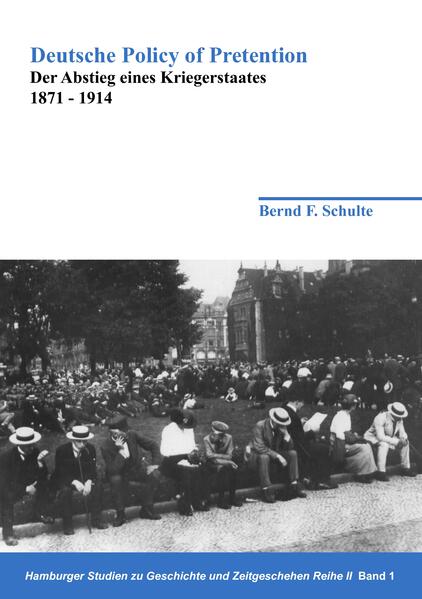Bernd Schulte has put forward the most plausible explanation for the crisis which may be summarised as follows: Germany had long-term ambitions to become the predominant power in the world. But this was only possible with the collaboration of Austria-Hungary as junior partner. At the time the latter Power had become literally bankrupt. Her fiscal status was catastrophic and appeals to Germany for the necessary loans had no chance of being considered because of Germanys own limited fiscal capacity. But Germany had another way to solve the dilemma, namely by urging Austria-Hungary to move aggressively against Serbia, advocating war on a buy-nowpay-later basis. The documentary evidence for this conclusion was supplied by the German Legationsrat (Legation Counsellor) in Vienna, none other than the German Chancellors own cousin, Dietrich von Bethmann Hollweg, now disclosed for the first time by Herr Schulte.9 As a free-lance historian, Herr Schulte has appeared unannounced like a mysterious stranger in town whom one is both afraid to welcome but cannot ignore, and whose academic credentials as a former doctoral student of Fritz Fischer are impeccable. Schultes work constitutes a historiographical phenomenon resulting from his facility to gain access to the private archives particularly of First World War high-ranking German officers. What he has been able to uncover to date, and continues to do, emphasises again and again that the power elite in Germany were so anxious about their continued status in the Reich that they would not shy back from risking all-out war to ensure that the Prusso-German social structures remained intact.
9 See also by the same author: Das deutsche Reich von 1914: Europäische Konföderation und Welt Reich (Hamburg, 2012); Deutsche Policy of Pretention: Der Abstieg eines Kriegerstaates 1871-1914 (Hamburg, 2009); Rückbesinnen und Neubesinnen: Beiträge zur Deutschen Frage 1850 bis 1949 (Hamburg, 2000).
133
Not dissimilar to the findings of John Röhl on the Kaiser and his court,10 Schulte reveals the values of a peculiarly Prusso-German cast of mind. This is relevant to the image of Great Powers as Beasts of Prey . There is no doubt that each Great Power would resort to war if its status were challenged. In that regard,
And as Schultes numerous publications have shown, the self-perception of the army officers was that they were the real power behind the throne. No other group really counted. Of course, the education of the generations of students in Germany since 1871 had ensured that this very illiberal, anti-democratic, anti-parliamentarian mentality was shared and endorsed by the majority of the educated middle and upper classes. If one was too liberal, too Catholic and, God forbid, to any degree socialist, one was not a true German.13 And this national indoctrination process was both initiated and pursued by history professors of impressive erudition who thereby exerted immense political-pedagogic influence.14
10 John Röhl, Wilhelm II: Into the Abyss of War and Exile (Cambridge, 2014). 11 Jonathan Steinberg, Bismarck: a Life (Oxford, 2011). 12 Ernst Rudolf Huber, Deutsche Verfassungsgeshichte seit 1789 7 vols (Stuttgart, 1957-1984). See especially vol. 3 Bismarck und das Reich. 13 This mentality is reflected in literature. The arguably two most perceptive works in this regard are 1) Heinrich Mann, Der Untertan (1918) most recently translated as The Man of Straw; 2) The stage play by Carl Zuckmayer, Der Hauptmann von Koepenick (1931) translated as The Captain of Koepenick. 14 Already back in 1886 the English German-trained historian, Lord Acton had observed the growth of the school of political historians in Germany. See his German Schools of History , English Historical Review, Vol. I (1886), pp.7-42. Further, see Georg G. Iggers, The German Conception of History: The National Tradition in historical Thought from Herder to the Present (Middletown CT, 1968).
134 John A. Moses
Consequently the state within the state ensured that Germany was to march down a separate path to modernity assiduously eschewing the liberalism of the West, the much discussed Sonderweg. The literature on this theme is vast, and astute foreign observers such as the above-mentioned George Arnold Wood were already before the First World War very aware of it. What Bernd Schulte has done is to remind his fellow countrymen in chapter and verse that this was so. To ignore it is to write less than honest history . The root cause of the Great War was the anxiety of the PrussoGerman military elite, the Pan-Germans, the captains of industry and commerce, the professoriate encompassing especially historians and Protestant theologians, and all those who were fearful about the seemingly inexorable rise of the Social Democrats internally and the burgeoning strength of the other Great Powers externally, especially the Western ones. The very existence of foreign states of successful liberal, parliamentary culture was a permanent reproach if not threat to the German autocratic monarchies. They lived in a world of ideas more akin to those of Frederick the Great of Prussia in the eighteenth century. Dr Schulte brings all this to a point in his research. Here the well-known AngloGerman antagonism (Paul Kennedy) is made more comprehensible in the hitherto unexplored correspondence of Prusso-German officers as well as in official memoranda. What is chilling about the self-perception (Selbstverständnis) of the PanGerman, military power elite, is their outlook on the world, their mentalité, especially the ferocity of their anti-British convictions. They projected the image of polar opposites such as Professor Werner Sombart (1863-1941) did in his famous war book of 1915, Händler und Helden (Traders and Heroes) where the English shopkeepers pettifogging spirit (Krämergeist) was contrasted with the noble, cultivated and philosophic spirit of the Germans. The German mind was driven by the most elevated impulses out of which grew the German Sendungsbewusstsein or sense of mission to the world, specifically to bestow upon neighbouring peoples the benefits of a superior Kultur - by force if necessary. This is an explanation for German imperialism akin to the earlier work of the Austrian scholar Josef Schumpeter (1883-1950), The Sociology of Imperialism (1919) and Capitalism, Socialism and Democracy (1942) in which he spoke of militarism becoming a problem when leading generals influenced political decision-making, and this they surely did in Prussia-Germany, though admittedly the army budget was indeed voted on in the Reichstag but initially only every seven years (Septennat) and later every five years (Quinquenat). This constitutional provision enabled the military budget to be passed relatively smoothly when the conservative parties combined to ensure a parliamentary majority.15 And here is the point that many historians, including German, fail to grasp: Germany was a blatantly naked military monarchy with a parliamentary fig leaf. It is relatively easy to see how it opted for war in August 1914 because it suffered from a deep rooted Konzeptionslosigkeit, that is an inability to conceive of alternative political solutions.16 15 The passing of the massive naval budget was another matter and had to be fought tenaciously in the Reichstag against the combined opposition of the Social Democrats and the Roman Catholic Centre Party. See Volker R. Berghahn, Der Tirpitzplan: Genesis und Verfall einer innenpolitiscen Krisenstrategie (Düsseldorf, 1971); Germany and the Approach of War 1914 (New York, 1993); Imperial Germany 1871-1918: Economy, Society, Culture and Politics (New York, 2004). 16 A very important feature of German intellectual history throughout the nineteenth century that is mostly ignored by secular historians is the religious mind-set of many German Protestants. Attention has been drawn to this by Professor Hartmut Lehmann in many works both in German and English.
Review Article: Into the Abyss 1914-1918 135
So much has been written about this since the eruption of the Fischer controversy particularly after the 1964 Berlin Historians Congress when for the very first time Fischer and his school ventured to defend themselves in a public forum. Their stance at the time became both national and international news. Now his pupil, Bernd Schulte, continues the historiographical campaign where Fischer and his associates had left off.17 Bernd Schulte, by virtue of his archival diligence, has been able to highlight those features of Bismarckian and Wilhelmine Germany which distinguished it as a political entity sui generis. In short, it was a very modern country in scientific, industrial and commercial achievements but with regard to political culture Germany was very backward, still cultivating values from the age of absolutism, indeed living in the past. This was politically volatile. Of course, many scholars had already drawn attention to this, but Schulte has brought out in high relief just how strong the influence of very reactionary officers was in the corridors of power in Berlin.18 A critical examination of Bismarckian and then Wilhelmine Germany is an essential exercise in explaining the origins of the Great War of 1914-1918. Any attempt such as that made by Christopher Clark in his study, The Sleepwalkers, that fails to take adequate account of the peculiarity of Wilhelmine society is bound to be misleading. For example, Clark understates the crucial domestic situation in the Reich which made it such an unstable society. Striking was the anxiety among the ruling classes concerning the growing organisational presence of social democracy and trade unionism.
Australian Journal of Politics and History: Volume 63, Number 1, 2017, pp.129-137. J.A.Moses










